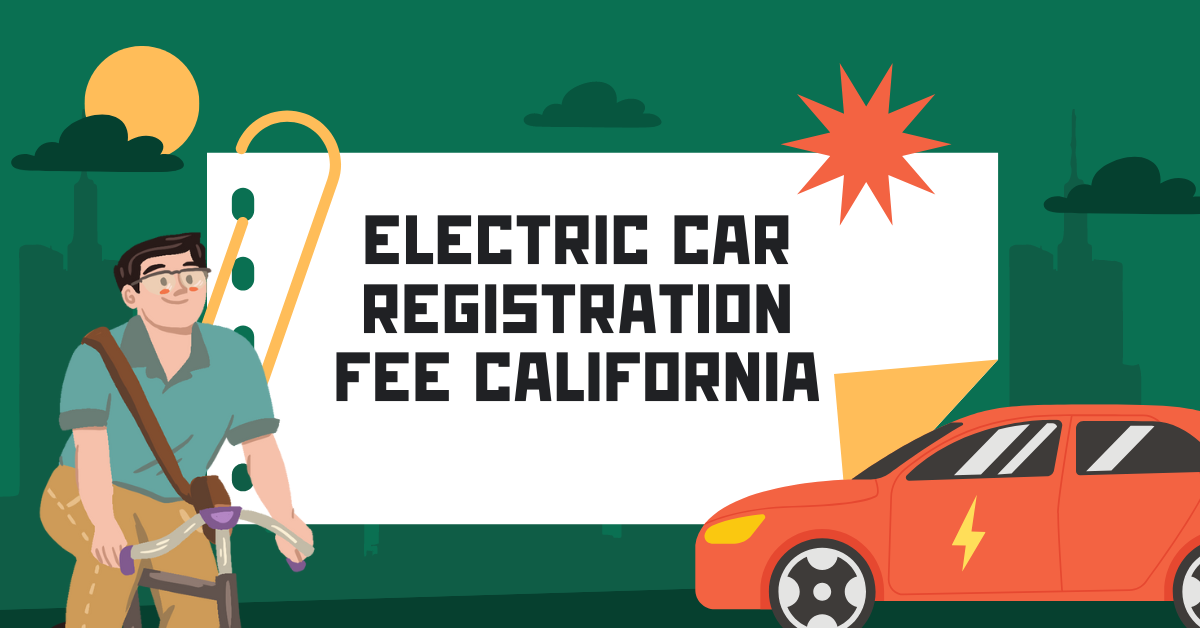The electric car registration fee California ranges from $100 to $175 annually. This fee is in addition to standard registration costs.
California aims to promote sustainable transportation while generating revenue for road maintenance. Electric car owners must pay an annual fee ranging from $100 to $175. This fee depends on the vehicle’s year and type. It ensures electric vehicles contribute fairly to infrastructure upkeep, as they do not pay gas taxes.
This policy supports environmental goals and maintains road quality. Electric car owners should budget for this fee to avoid surprises. Understanding these costs helps in making informed decisions about electric vehicle ownership in California.
Registration Fee Overview
Understanding the registration fee for electric cars in California is vital. These fees impact every electric vehicle owner in the state. This section will break down what these fees are and why they exist.
Definition Of Registration Fee
The registration fee is a cost associated with registering your electric car. This fee is mandatory for all vehicle owners in California. The fee varies depending on the type of vehicle you own.
| Vehicle Type | Registration Fee |
|---|---|
| Electric Car | $100 |
| Gasoline Car | $150 |
Purpose Of The Fee
The purpose of the fee is to fund road maintenance and improvement projects. Electric cars do not pay gas taxes, which usually fund these projects. The registration fee helps fill this gap.
- Maintains road infrastructure
- Supports environmental programs
- Ensures fair contribution from all vehicle owners
Paying this fee ensures better roads and cleaner air for everyone. It also ensures that electric car owners contribute to public funds.

Credit: www.reddit.com
Fee Structure
The electric car registration fee in California varies. The state has a structured system to determine these fees. This ensures fairness and transparency.
Base Fee
The base fee is the starting point. This is a flat fee for all electric cars. The current base fee is $100. This fee goes to the state’s road fund.
Additional Charges
Other charges may apply. These are based on specific factors. Here are some of the additional fees:
- Weight Fee: Heavier cars pay more. This fee helps maintain roads.
- Local Fees: Some areas have extra charges. These are for local road projects.
- Special Plate Fee: Want a custom plate? There’s an extra fee for that.
Here’s a quick look at the typical fees:
| Type of Fee | Amount |
|---|---|
| Base Fee | $100 |
| Weight Fee | $50 – $200 |
| Local Fees | Varies by location |
| Special Plate Fee | $40 |
These fees ensure roads are maintained. They also support local projects. Always check for the latest fee updates.
Factors Influencing The Fee
Understanding the factors influencing the electric car registration fee in California is crucial. These factors help determine how much you will pay. Let’s delve into some key aspects.
Vehicle Type
The type of vehicle significantly affects the registration fee. California classifies vehicles into different categories. These categories include sedans, SUVs, and trucks.
The fee varies based on these classifications. For example, registering an SUV might be more expensive than a sedan. This is because larger vehicles often incur higher fees.
Battery Capacity
Another important factor is the battery capacity of the electric car. Vehicles with larger batteries generally have higher fees.
California bases part of the fee on the car’s environmental impact. Larger batteries usually mean longer driving ranges. This can lead to higher registration fees.
Here is a table showcasing different battery capacities and their potential impact on fees:
| Battery Capacity (kWh) | Possible Fee Impact |
|---|---|
| 0-50 kWh | Lower fee |
| 51-100 kWh | Moderate fee |
| 101 kWh and above | Higher fee |
Understanding these factors can help in budgeting for your electric car. Make informed decisions based on vehicle type and battery capacity.
How To Register Your Electric Car
Registering your electric car in California is a simple process. Follow the steps below to ensure you have everything you need. This guide will help you through the registration process efficiently.
Required Documents
To register your electric car, you need certain documents. These documents ensure your car meets all legal requirements.
- Proof of Ownership: This can be a title or bill of sale.
- Insurance Proof: You must have valid car insurance.
- Smog Certification: Electric cars are usually exempt, but check.
- Vehicle Identification Number (VIN) Verification: This can be done by the DMV.
- Application for Title or Registration: Complete the DMV form.
- Payment for Fees: Have your credit card or check ready.
Step-by-step Process
Follow these steps to register your electric car in California:
- Gather Documents: Collect all the required documents.
- Visit the DMV Website: Check the DMV website for any updates.
- Complete the Application: Fill out the application form online or at the DMV.
- Schedule an Appointment: Book an appointment to visit the DMV.
- Visit the DMV Office: Bring all documents and your car for VIN verification.
- Pay the Fees: Pay the registration and any other necessary fees.
- Receive Registration and Plates: You will receive your registration and plates.
By following these steps, you can register your electric car efficiently. Make sure you have all your documents ready to avoid delays.
Exemptions And Discounts
Electric car owners in California may face various registration fees. However, there are exemptions and discounts available. These can significantly reduce costs. Understanding these can save you money.
Who Qualifies
Not everyone qualifies for these exemptions and discounts. Here are some common qualifiers:
- Low-income households may qualify for reduced fees.
- Senior citizens may receive discounts on registration fees.
- Veterans might be eligible for special exemptions.
- Disabled persons can get discounts or full exemptions.
- Clean Air Vehicle owners often receive fee reductions.
How To Apply
Applying for these exemptions and discounts is straightforward. Follow these steps:
- Check if you qualify based on the criteria above.
- Visit the official California DMV website for the application forms.
- Complete the forms with accurate information.
- Submit the forms online or at a DMV office.
- Wait for confirmation and approval from the DMV.
Below is a table summarizing the key points:
| Qualifiers | Type of Benefit |
|---|---|
| Low-income households | Reduced fees |
| Senior citizens | Discounts on registration fees |
| Veterans | Special exemptions |
| Disabled persons | Full or partial exemptions |
| Clean Air Vehicle owners | Fee reductions |
Make sure to check the specific eligibility requirements. Each category has its own rules and benefits.

Credit: www.reddit.com
Comparing Fees With Other States
Electric car owners in California face specific registration fees. These fees can be higher compared to other states. Understanding the differences helps make informed decisions.
Fee Differences
Electric car registration fees vary by state. Here’s a comparison of some key states:
| State | Registration Fee |
|---|---|
| California | $100 |
| Colorado | $50 |
| Oregon | $110 |
| Georgia | $200 |
California’s fee is moderate. Georgia has the highest fee.
Reasons For Variations
Several factors cause fee differences:
- State Policies: Each state sets its own policies.
- Infrastructure Costs: States with better infrastructure may charge more.
- Environmental Goals: States with green goals may have lower fees.
California uses its fees to fund road maintenance. Some states use fees to encourage electric car adoption.
Future Trends
The landscape of electric car registration fees in California is evolving. As more electric vehicles (EVs) hit the roads, these trends will impact drivers and the environment.
Possible Fee Changes
California may adjust electric car registration fees soon. Currently, EV owners pay an annual fee to support road maintenance. The fee structure might change to encourage more EV adoption.
| Year | Current Fee | Proposed Fee |
|---|---|---|
| 2023 | $100 | $80 |
| 2024 | $100 | $70 |
Lower fees might drive more people to choose electric cars. State officials aim to balance revenue needs and environmental goals.
Impact On Electric Car Adoption
Fee reductions could boost electric car sales. Lower costs make EVs more appealing to potential buyers.
- More affordable EVs: Lower fees reduce the total cost of ownership.
- Increased adoption: More people will switch to electric cars.
- Environmental benefits: More EVs mean fewer emissions.
Policymakers hope these changes will make California a leader in electric vehicle adoption. As fees decrease, expect more EVs on the road.
Overall, future trends in electric car registration fees in California look promising. Changes aim to support sustainability and reduce costs for drivers.

Credit: www.reddit.com
Frequently Asked Questions
How Much Does It Cost To Register An Electric Car In California?
Registering an electric car in California costs between $60 and $175. Fees vary based on the vehicle’s value and county.
Why Do Electric Vehicles Cost More To Register?
Electric vehicles cost more to register due to higher state fees and taxes. These funds support road maintenance and infrastructure.
How Much Are Tesla Tags In California?
Tesla registration tags in California typically cost between $400 and $600 annually. Fees vary based on vehicle model and county.
What Is The Registration Fee In California?
The registration fee in California varies. It typically ranges from $60 to $125 based on vehicle type and location.
Conclusion
Understanding the electric car registration fee in California helps you plan better. It’s essential for budget-friendly decisions. Stay informed about changes in regulations. This ensures you get the most benefits from your electric vehicle. Make smart choices and enjoy the eco-friendly ride!
